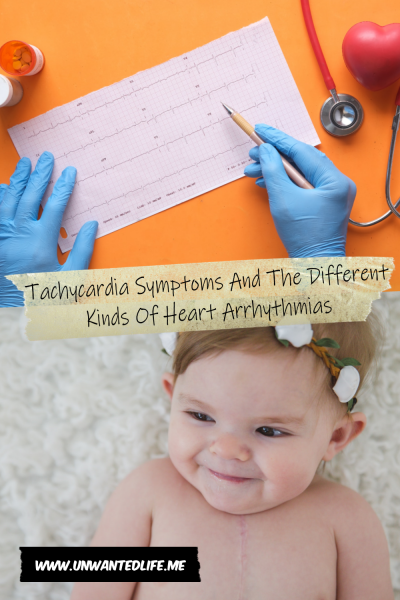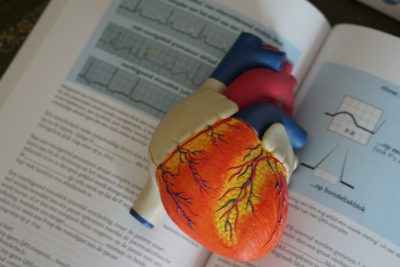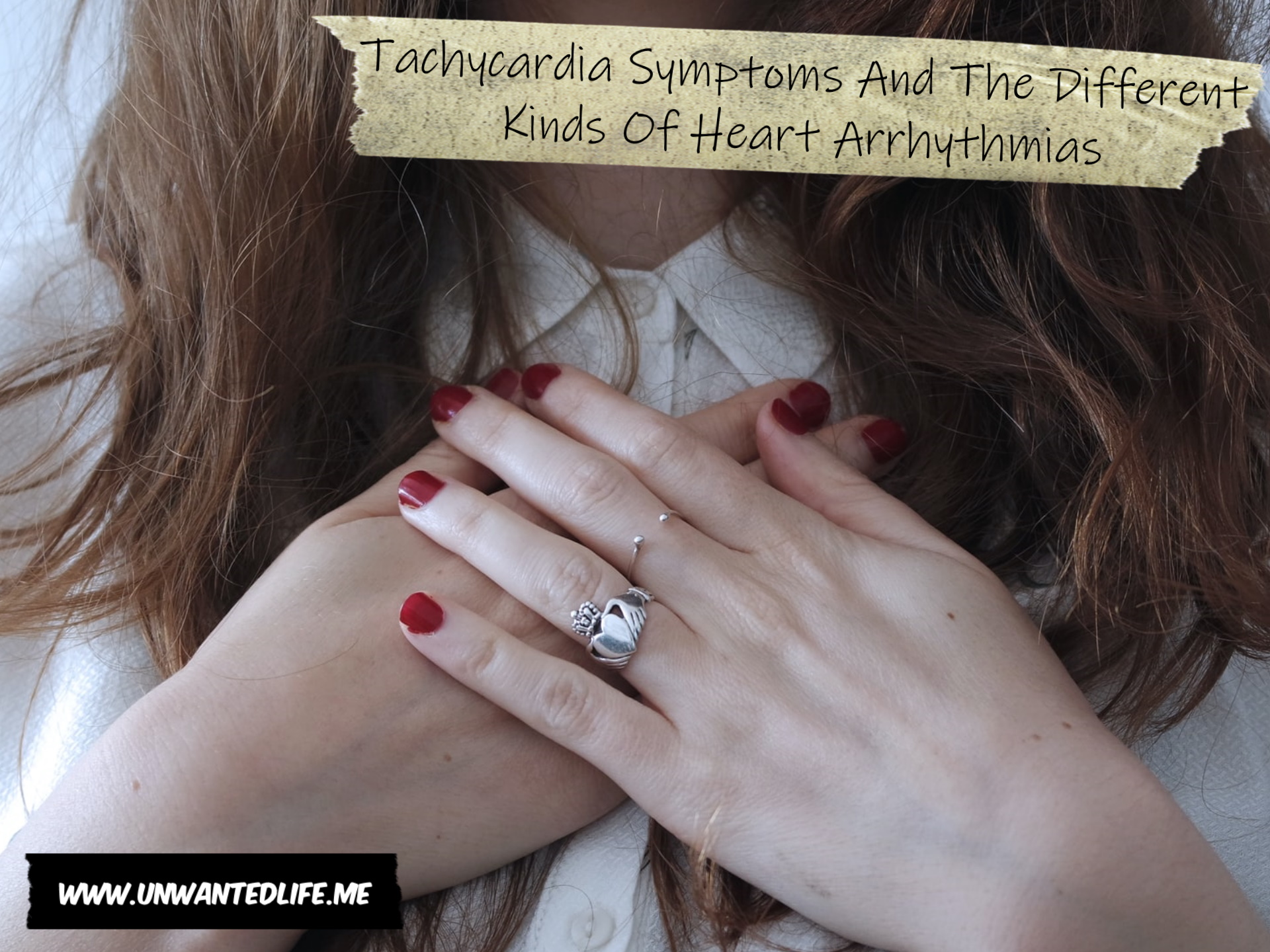I thought I’d write this article on heart arrhythmias and tachycardia symptoms because I’ve experienced two different types of heart arrhythmias since 2013. For which I currently take a beta blocker to help manage these heart arrhythmias.
However, I also know how difficult it can be to get anyone to take your heart arrhythmias seriously when you have a history of mental health, or because some doctors don’t listen and just default it to being because of anxiety or something along those lines. Thus, here’s some helpful information on tachycardia symptoms and the different kinds of heart arrhythmias, in case it might help you.
What Is Tachycardia?
Simply put, tachycardia is a medical term for when someone has a heartbeat that’s over 100 beats per minute (Mayo Clinic). Obviously, situations where someone’s heart should beat fast, such as during exercise, are situations where it’s rarely something to be concerned about. Thus, tachycardia is when a heartbeat is greater than 100 beats per minute when a person is at rest (Cedars-Sinai).
What Are Heart Arrhythmias?
A heart arrhythmia is when you have an irregular heartbeat, such as the heart beating too slowly, too fast, or irregularly (NHS). Many of these heart arrhythmias can cause tachycardia (Mayo Clinic).
Tachycardia Symptoms
The basic characteristics of all the tachycardia symptoms are that there may not be enough blood being pumped to the rest of your body, thus stopping the body from getting the oxygen it needs. Because of that risk, and my experience of having it, I thought creating a list of the common tachycardia symptoms would be useful. The following signs and symptoms were taken from the Mayo Clinic and Healthdirect.
- Palpitations, which is the sensation of a racing, pounding heartbeat, or flopping in the chest.
- Dizziness and light-headedness.
- Chest pain.
- In severe situations, people can have a heart attack or become unconscious (fainting).
- Have a rapid pulse.
- Shortness of breath.
It should also be noted that not everyone with tachycardia will have tachycardia symptoms. Some people can be symptomless, with their condition only being found out because of a health exam.

Types Of Tachycardia
Atrial fibrillation (A-fib)
This is the most common form of tachycardia. The Mayo Clinic says that A-fib causes irregular and chaotic electrical signals in the upper chambers of the heart (atria) causing a fast heartbeat. Often this is a temporary condition, although sometimes it won’t end without a treatment intervention.
Atrial flutter
An atrial flutter occurs when a short circuit in the heart causes the upper chambers (atria) to pump rapidly (Johns Hopkins Medicine). According to the Mayo Clinic, this condition is like A-fib, accept the heartbeats are more organised and can go away by themselves, although sometimes they require treatment.
Atrioventricular (AV)
AV is a form of heart block where the electrical impulses are delayed/blocked as they travel between your the top chambers of your heart (atria) and your the bottom chambers of your heart (ventricles), according to The British Heart Foundation.
Brugada syndrome
This condition is usually caused by an inherited faulty gene. Brugada syndrome is a rare but serious condition that affects the way electrical signals pass through the heart, causing it to beat dangerously fast (NHS).
Inappropriate sinus tachycardia (IST)
Inappropriate sinus tachycardia is a rare but benign type of arrhythmia within the SVT group (Wikipedia). IST might be caused by a structural abnormality in the sinus node and it can occur in seemingly healthy individuals with no history of cardiovascular disease (Wikipedia). Furthermore, Cedars-Sinai state IST has many causes, but experts do not understand all of them. One such cause comes from inappropriate signalling of the nerves that increase the heart’s rate. Another is that the nerves that lower the heart’s rate aren’t working as intended.

Long QT syndrome
This condition is usually an inherited condition whereby the person with it has it inherited a fault gene, which affects the heart’s electrical activity (NHS).
Supraventricular tachycardia (SVT)
SVT is a condition that occurs in the upper chambers of the heart, causing episodes of an abnormally fast heart rate that suddenly starts racing, then stops racing, or slows down abruptly (NHS Inform). This condition isn’t normally serious, and usually only lasts a few minutes to several hours, happening a few times a day or once a year (NHS).
Ventricular fibrillation (V-fib)
This condition is a serious problem which can lead to death if the heart rhythm isn’t restored within minutes (Mayo Clinic). V-fib is characterised by disordered electrical activity that causes the heart’s lower chambers (ventricles) to quiver or fibrillate, instead of contracting normally, prohibiting the heart from pumping blood (American Heart Association).
Ventricular tachycardia
Ventricular tachycardia is a type of arrhythmia, where faulty electrical signals in your the lower chambers of your heart (ventricles) cause your heart to beat faster than normal (Bupa). The arrhythmia doesn’t allow the ventricles to contract (fill and squeeze) to pump enough blood to the body, with episodes lasting only a couple of seconds without causing harm (Mayo Clinic). Although episodes lasting longer than that can be life-threatening.
Wolff-Parkinson-White syndrome
According to the NHS, Wolff-Parkinson-White (WPW) syndrome is a condition you’re born with which results in extra electrical connections in the heart. Sometimes the person with this condition won’t have any symptoms, while others will have periods of abnormally fast heartbeats.
My Tachycardia Symptoms
When I first started getting chest pains, it came out of nowhere. I had decided one day to try and get back into shape during Spring, and started to workout in my room. Within minutes of attempting to exercise, I got this sharp stabbing pain that wouldn’t go away, even though I’d stopped working out.
This chest pain lasted for about two weeks, but wasn’t constant at this stage. By the time two weeks came about, I made an appointment to see my GP and they referred me to get an ECG done. When I had my first ECG, the chest pains still weren’t constant yet, but I was finding it extremely difficult to cope day-to-day.
My first ECG showed I had supraventricular tachycardia, but it would be a very long time before they would start me on any medication to control it. During the time between my first diagnosis and starting on my beta blocker, I had several other tests. The problem was, while I was waiting I with living with the daily feeling like someone was kicking the inside of my ribs with every heartbeat. As you can probably guess, that not only made it difficult to sleep, but the slightest amount of stress or anxiety would make me bed bound.
Once I started on beta blockers, everything got better and I rarely got chest pains. The weird thing was, after about five years on the beta blocker, when I get another ECG as part of another test (which I stopped taking me medication for), my supraventricular tachycardia had changed to inappropriate sinus tachycardia. Instead of feeling like someone was trying to kick their way out of my rib cage, I just had random heart arrhythmias. The slightest bit of movement would trigger a rapid heartbeat.
I still get some chest pains, but now it seems my heart is fully committed to the problem being inappropriate sinus tachycardia rather than the debilitating supraventricular tachycardia I had for over a year.
As part of the investigation into my tachycardia symptoms, I went through a lot of stress and exercise tests and had my heart imaged a few times to check for abnormality. One such test was my tilt table test. These were done to see which of the above types of tachycardia better fit my symptoms. Fortunately, the tests showed that structurally my heart is fine, so it appears to be an issue with my autonomic nervous system sending incorrect signals to my heart. But whatever the reason, the beta blocker I’m taking is managing my tachycardia symptoms.
The one major issue I’m stuck with is how tachycardia symptoms appear to be causing me to have exercise intolerance. When I try to exercise, within minutes I get dizzy and my balance goes. If this escalates, my muscles go weak and I have a few minutes before I lose the ability to move. When this happens, it takes me about 40 minutes to recover. But here’s the annoying part: this could also be caused by my reactive hypoglycaemia or a combination of the two.
Because of this, I got a heart rate monitor, downloaded Bearable, and with my glucose monitor, proceed track my symptoms to gather some data. I passed the data on to my specialist cardiologist and some of my other doctors, but we still don’t have any answers. Because of this, I’ve got yet more scans and tests to do some nine years after my first arrhythmia symptoms appeared.
Annoyingly, at every step in investigating my tachycardia symptoms, every medical professional kept trying to pass it off as a mental health issue. No matter how many times I had to explain that it wasn’t, what triggers the onset of symptoms, and how my anxiety has never caused tachycardia symptoms since my anxiety disorders started around 1999 or when they got cemented with psychosis in the next couple of years, no one would believe me.
My tachycardia symptoms started well over a decade later. Not once had I ever complained about tachycardia symptoms before that. Not once. It’s so frustrating to go through this repeatedly, even when the ECGs picked up my tachycardia symptoms every single time.
Summary
This article listed several types of tachycardia, but that wasn’t a complete list. There are other forms that I didn’t mention. Although there are quite a few different forms of tachycardia, they all have a lot of overlapping tachycardia symptoms. This means it’s easy to identify if you may have an issue with tachycardia by the universal tachycardia symptoms.
Also, if your tachycardia symptoms are anything like mine, then they may change over time, so it can be a good idea to get your ECGs done every few years.
As always, leave your feedback in the comments section below. Also, please share your experiences of tachycardia symptoms, heart arrhythmias, and ECGs in the comments section below as well. Don’t forget, if you want to stay up-to-date with my blog, then sign up for my newsletter below. Alternatively, get push notifications for new articles by clicking the red bell icon in the bottom right corner.
Lastly, if you’d like to support my blog, you can make a donation of any size below. Until next time, Unwanted Life readers.
Tachycardia Symptoms Support
Click here to check out the Arrhythmia Alliance’s heart rhythm checklists, which can help you gather the data needed to discuss your symptoms with your GP, doctor, or specialist.


Informative post on how to differentiate between various heart arrhythmias and symptoms of tachycardia
Thank you
This is very interesting. I knew about AF but not the rest.
Glad I was able to expand your awareness
New thing to me and I don’t think I got it before. But I will keep it in mind to be aware in the future. Thank you for sharing!
Hopefully it won’t be something you’ll ever experience
Very informative. I knew nothing about any of these.
Thanks
It is incredibly hard to get doctors and health professional to listen to me over even the smallest things. I believe it is a case of the doctors believing they inherently know more about medical conditions. While their knowledge is greater than mine, I am the one who knows the triggers and ailments of my body. It is within a doctor’s best interests to take into account my experience of events in order to more fully inform their diagnosis and suggestions. Yet, somehow, very few doctors actually listen . . .
Thanks so much for sharing another thought-provoking article!
Indeed it is in everyone’s best interests for doctors to take individuals experience of their issues as being significant. Too many times people I’ve know have died of cancer because medical professionals have dismissed what they’ve been told
This is really informative. We’ve actually never heard of Tachycardia before.
Thank you. Happy you learnt something new while visiting my blog
I’m so sorry to hear your personal struggles with tachycardia. I’ve been diagnosed with Postural Tachycardia Syndrome (PoTS) which is where your heat beats too fast causing a whole lot of symptoms. It’s the most horrible feeling, isn’t it? Thank you for sharing this and bringing it to peoples attention. It’s a really education post Xo
Elle – ellegracedeveson.com
PoTS was a diagnosis they considered with me too, but so far they’ve not found that I have it, although I’m still undergoing tests some eight years later
Such an informative post! I’m not very familiar with this medical condition so the amount of information given and personal testimony given is appreciated. I’m sorry you have to go through this and I’m sure it can be scary at times! And to not being able to exercise…I would be so frustrated. Are there any low intensity exercises you can do?
It doesn’t take much to kick start the first wave of symptoms. A minute on an exercise pack, 10 reps on a bar bell at a really manageable weight, running up a flight of stairs too fast, etc. It’s super frustrating
I didn’t know much about these conditions and the symptoms. This blog post was really informative and can teach so many people about these conditions. Thank you for sharing.
Lauren – bournemouthgirl
Thanks for reading
Very interesting post. I’ve heard of arrhythmia but I never knew that there were so many different varieties
Thanks
Another informative well written post! I hate to hear about your struggles, but glad to hear you’re getting relief from the beta blockers at the moment. I’m not sure what kind of exercise you’ve been doing, but have you ever tried Yin Yoga? It targets the connective tissue. It’s very quiet. It’s on the floor and super supported with tools. Superb for the body and mind without being noisy and upbeat.
I’ve tried yoga before, but I’ve not heard of Yin Yoga, I’ll have to look that one up. Thanks for the suggestion
This was really interesting to read. While I was familiar with tachycardia and the basics of heart arrhythmias, I had no idea that there were so many different types. I’ve dealt with some heart issues of my own in the past and it can be really stressful. I’m glad to hear that you were able to get the assistance that you needed and have started on a treatment/management plan.
I was surprised too a out how many different types there are. I hope your heart scare has stayed in the past
Very informative. I didn’t realize there were so many different types. I understand your struggle to be heard and action taken on your concerns. It seems that when there is a chronic issue, everything gets blamed on that and it really takes persistence or changing doctors for anything to happen.
Indeed it does
Thanks for educating us on heart condition. It was very informative. I am surprised that HCP Rx Beta Blockers as a treatment for Tachycardia.
Thanks for reading
I am made aware of different similar conditions recently. It’s scary to think of something like yours just appearing so suddenly out of the blue. I am convinced too, that doctors dont know everything. maybe for a lot, they’ve not come upon that before.
It’s impossible to know every single thing about a field, even for a doctor
You provided some important tips and information regarding arrhythmias. I am very sorry about your personal struggle. It definitely can be pretty scary. Too often misdiagnosis can lead to further severe suffering. Really appreciate you sharing your story and some facts regarding this topic. Hoping you feel better.
Pastor Natalie (ExamineThisMoment)
Letstakeamoment.com
Thanks. I’m getting an autonomic functions test next, so hopefully that’ll shed more light
I’ve read articles on your blog before so I shouldn’t have been, but I was impressed nonetheless and happy to see such a well written, detailed and researched article! I’ve never read anything extensively on heart problems and you really brought awareness to the topic.Thank you for educating us. I’m sorry to hear that you’ve had to go through these personally, I saw in the comments you’re getting another test so I hope it will bring clarification and direction.
Thank you. Yeah, I really hope this test provides much needed answers as I’ve been waiting a long time now
Wow, this is such an informative post. Thank you for sharing this important information and your story. Great post.
Thanks
This was very informative! Thank you for sharing you story with us and teaching us more about tachycardia
Thanks for reading
Great post. Thanks for sharing.
Thanks
Very informative post!
Thanks